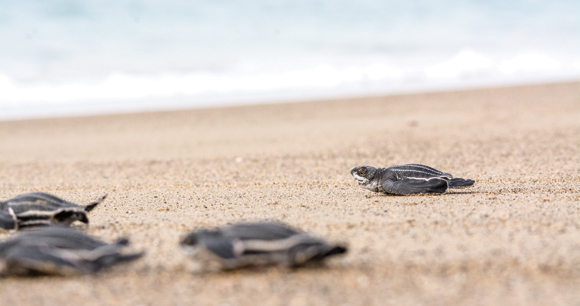Sea Turtles Thriving on Unoccupied Beaches
The nesting season of sea turtles has begun in the Northern Hemisphere. During this time, mother turtles digging nests in the sand are often disturbed by human beachgoers. Newborn hatchlings face similar disturbance when returning to the sea. However, this year has seen elevated numbers of nests as COVID-19 restrictions have kept people away from beaches.

In Florida, where the nesting season runs from March through October, researchers have documented more nests at sites such as Juno Beach, a few miles north of West Palm Beach. According to the Loggerhead Marinelife Center, as of May 8 there were 728 turtle nests, with 591 of them loggerhead nests and the remaining 137 from the more vulnerable leatherbacks. Other southern states, such as Georgia and Texas, have also experienced a boom in sea turtle nesting this year.
Nesting sites in Brazil, Thailand, and India have seen similar results. In Brazil, around 100 hatchlings of the critically endangered hawksbill sea turtle were discovered in a single day in late March. Thailand has reported the highest number of leatherback nests in nearly two decades.
Human activities have long been an obstacle for sea turtles’ breeding and survival. Turtles mating in shallow near-shore waters are killed and injured by boats, while human activity on beaches makes it difficult for turtles to find good nesting locations. Artificial light disorients baby turtles as they attempt to make their way to the sea.
This year’s early nesting numbers are promising, but it is still too early to determine the true impact of the temporary human hiatus on sea turtles. As more and more jurisdictions lift the stay-at-home orders and beaches are reopened, sea turtles yet to hatch may face the usual disturbances as they head for the sea.
Program Terms: Marine Wildlife
AWI Quarterly Terms: Quick Read
Related News
North American Environmental Commission Confirms Mexico’s Role in Imperiling Vaquita
In Program: Marine WildlifeA commission under the United States-Mexico-Canada Trade Agreement (USMCA) released a report yesterday confirming that Mexico’s unwillingness to enforce its own wildlife protection, trade, and fisheries laws...
Captive dolphins face uncertain futures. They deserve better
In Program: Marine WildlifeIn this op-ed for the Tampa Bay Times, Dr. Naomi Rose, AWI’s senior scientist in marine mammal biology, discusses the challenges in caring for orcas...
Yahoo! Japan Sells Polluted Whale and Dolphin Meat Products to Unsuspecting Consumers
In Program: Marine WildlifeThe Animal Welfare Institute (AWI) and an international coalition of animal protection and environmental groups are calling on Yahoo! Japan and its parent company, the...
As Iceland Calls Off Fin Whale Slaughter, Japan and Norway Launch Cruel, Unsustainable Whale Hunting Seasons
In Program: Marine WildlifeJapan and Norway resumed slaughtering whales this month, while Iceland’s only fin whaling company has decided that it will not hunt this summer, citing a...